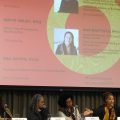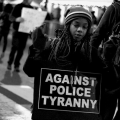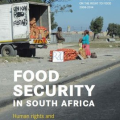SGPIA student Helena Gronberg is currently in Yangon, Myanmar conducting research for her thesis on women’s participation in the country’s peace process—she arrived January 8 and plans to stay through mid-March. Helena recently checked in with SGPIA staff to share more details about her research experience in the following Q&A.
What inspired you to choose the intersection of women, peacebuilding and Myanmar as the focus of your thesis?
It is an exciting time in Myanmar, to say the least, because there is a political transition going on as we speak—a peace process. Much of the processes to date have been, and continue to be, heavily male dominated. The decades of military rule and cultural patriarchal norms have contributed to the major issues preventing the realisation of women’s human rights, especially substantive participation of women in Myanmar’s peace process.
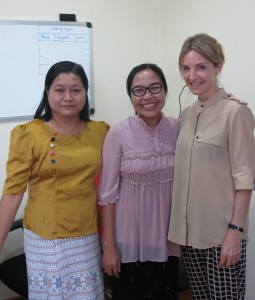
What does academic literature have to say about the benefits of women’s participation in peacebuilding?
Research has repeatedly shown a correlation between inclusive, participatory and open models of peace negotiations and a higher likelihood that the outcome will hold and prevent a relapse into conflict. Furthermore, women’s structural exclusion from peace talks has shown to have significant consequences for the extent to which issues such as violence against women and women’s citizenship are addressed.
Tell us more about what led to the political transition happening in Myanmar today.
Myanmar was ruled with an iron fist by the military for 50 years until in 2011 when it ceded power to a quasi-civilian government. In October last year a Nationwide Ceasefire Agreement (NCA) was signed between the Government and some of the Ethnic Armed Organizations (EAOs) that have been carrying out armed resistance for decades, and on November 8 Nobel Prize Winner Ang San Suu Kyi’s party, the National League of Democracy, won a landslide victory in the parliamentary elections. However, the NCA is neither inclusive nor comprehensive (some of the major EAOs did not sign) and the army still holds 25% of parliamentary seats. Who the next president will be remains a mystery as Suu Kyi technically is barred from the presidency by a 2008 constitutional amendment. In other words, much is at stake.
Describe what your research design has looked like.
My plan was to combine desk research with semi-structured interviews with women leaders of civil society as well as female representatives of the various armed groups to gauge their participation in the process. After arriving here, I was introduced to the Alliance for Gender Inclusion in the Peace Process (AGIPP) and met with them to better understand how they might be able to benefit from my research. They pushed me to further explore the role of the donor community in advocating for inclusivity in a process that is known for being quite “hands off.” I have actually also started volunteering with AGIPP when I am not conducting research—although I also find both activities to complement one another.
What has surprised you the most thus far in your work?
What has surprised me positively is the openness of people. I have been able to connect with quite a few stakeholders (activists, donors and international and national NGOs). People are interested in the topic and excited to share. Having said that, there is of course at times a sense of people perhaps not wanting to say too much.
What doesn’t surprise me is that it is very different to be here in person. When I started my research I had no idea of the complexity and the rapidly changing scenario. In New York City it was not easy to get information.
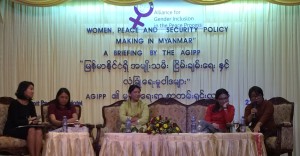
What courses helped you prepare for your trip and/or research? What else did you do to prepare?
The Methods course, Post-colonial and Feminist Theories of International Relations, Thesis Workshop and the Monitoring and Evaluation course. I also read up on Myanmar of course and contacted former colleagues from my time as Program Manager at the Global Network of Women Peacebuilders who were either based here or had contacts here.
How would you summarize your work thus far?
Using a framework of gender and conflict, I advance the argument that women’s meaningful participation (as opposed to inclusion) is necessary in order to guarantee sustainable peace and build a lasting democracy. It is very timely then to push (and argue) for women’s meaningful inclusion. While many donors at this time are hesitant to ruffle the feathers of the outgoing (as well as incoming) government, now is not the time to be silent. If not now, then when?
Helena will graduate from SGPIA in May with with a concentration in conflict and security.


